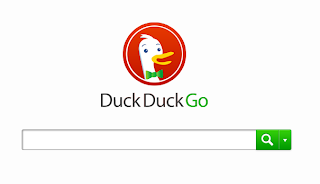For the past few months, after years of having Google’s search screen as my homepage, I have been trying an alternative search engine. I had been reading Karen Blakeman’s blog for a while, and in this post she recommended using four other search engines, in addition to Google.
I decided to use DuckDuckGo, and made it my homepage.
There are two things I really like about it:
1. It promises not to collect any personal data. It’s important to pay attention to online privacy, of course, but I also like to know that my searches are not influenced by my previous search history or other things I do using Google services. For example, I post on the IHR Digital blog, which is hosted by Google’s own blogging platform, so any search I do for “IHR Digital” is likely to be influenced by that connection.
2. It has what it calls !bang syntax: typing ! followed by a particular string allows a direct search of a particular site or interface. For example the search !gsc searches in Google Scholar only; !yt searches YouTube, and so on.
I find this second feature extremely useful. It turns out that a lot of my web searching is confined to sites that I know that I want to search. If I want to look for Katie Price’s various autobiographies on Amazon I simply type:
!amuk katie price autobiography
And if I want to look up Kant’s Metaphysics of Morals on Wikipedia I simply type:
!w metaphysics of morals
That’s Kant and Katie sorted, but how does DuckDuckGo fare with more general web searching? I tested it with the search string:
for sorrow there is no remedy provided by nature
On DuckDuckGo the top four results give me the start of the Samuel Johnson text I’m looking for. But the fifth result is from “The Christian View of Sorrow” and the article in question simply has the words remedy, nature and sorrow scattered about the snippet that I’m shown. The same goes for the rest of the results on the first page.
The same search on Google gives me a first page entirely full of the quotation I am looking for (from The Rambler):
For sorrow there is no remedy provided by nature; it is often occasioned by accidents irreparable, and dwells upon objects that have lost or changed their existence; it requires what it cannot hope, that the laws of the universe should be repealed; that the dead should return, or the past should be recalled.
The post on Karen Blakeman’s blog which got me started with DuckDuckGo was actually arguing in favour of using a range of search engines. By using DuckDuckGo as a default I have started to use two in conjunction. I search DuckDuckGo first, and then, if I want to be sure that I have good results, I repeat the search in Google, using – of course – the !bang for Google:
!g for sorrow there is no remedy provided by nature
DuckDuckGo suits my web habits, and I’m going to carry on using it. But it has also made me more aware of the differences between search engines, and perhaps even made me a bit subtler in my approach to searching.


Use “katie price autobiography site:amazon.co.uk” etc to achieve the same site scoping in Google – it is not limited to shortcodes pre-defined by DuckDuckGo and works for any domain or subdomain, including country TLDs (e.g. “site:fr”)
There’s a story here about Google’s new search tool, which seems to be a response to DuckDuckGo – http://www.guardian.co.uk/technology/2012/may/16/google-unleashes-new-seach-tool
I too have started to use DuckDuckGo (in spite of the name). I like its privacy policy as well as its clean layout of search results. It’s not afraid to say it can’t find anything and gives you the ability to start an immediate search on Google or Bing etc…I too like the !bang syntax search – so much easier than the rather clumsy Goggle method. It also takes you straight to the entry eg !W Tasmania takes you to the Wikipedia page for Tasmania; while the Google search offers a list of all Wikipedia results with Tasmania in it. Perhaps I find it better using Duck as I know exactly what I’m looking for.
Hi RichardGood point – I should have mentioned that you can do this on Google. In terms of user behaviour, though, when I used Google predominantly I would type:amazon uk katie price autobiographyBecause I could never quite remember the syntax for Google’s site searching. There is also the slight advantage (important to the mouse-averse like me) that DuckDuckGo takes me to the site in question by default, rather than to a list of search results.